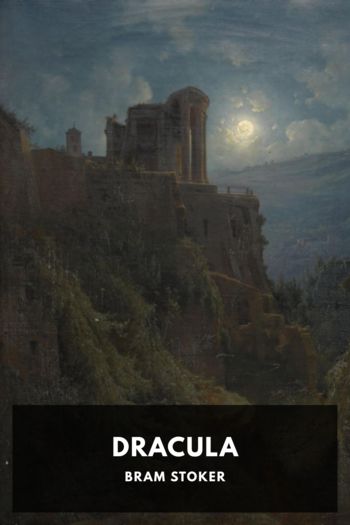Dracula by Bram Stoker (readnow TXT) 📕

Description
Dracula is one of the most famous public-domain horror novels in existence, responsible not just for introducing the eponymous Count Dracula, but for introducing many of the common tropes we see in modern horror fiction.
Count Dracula isn’t the first vampire to have graced the pages of literature—that honor is thought to belong to Lord Ruthven in The Vampyr, by John William Polidori—but Dracula is the vampire on which modern vampires are based.
Dracula wasn’t as famous in its day as it is today; readers of the time seemed to enjoy it as nothing more than a good story, and Stoker died nearly penniless. But its long-lasting influence is undeniable, and for all its age Dracula remains a gripping, fast-paced, and enjoyable read.
Read free book «Dracula by Bram Stoker (readnow TXT) 📕» - read online or download for free at americanlibrarybooks.com
- Author: Bram Stoker
Read book online «Dracula by Bram Stoker (readnow TXT) 📕». Author - Bram Stoker
In the library I found, to my great delight, a vast number of English books, whole shelves full of them, and bound volumes of magazines and newspapers. A table in the centre was littered with English magazines and newspapers, though none of them were of very recent date. The books were of the most varied kind—history, geography, politics, political economy, botany, geology, law—all relating to England and English life and customs and manners. There were even such books of reference as the London Directory, the “Red” and “Blue” books, Whitaker’s Almanac, the Army and Navy Lists, and—it somehow gladdened my heart to see it—the Law List.
Whilst I was looking at the books, the door opened, and the Count entered. He saluted me in a hearty way, and hoped that I had had a good night’s rest. Then he went on:—
“I am glad you found your way in here, for I am sure there is much that will interest you. These companions”—and he laid his hand on some of the books—“have been good friends to me, and for some years past, ever since I had the idea of going to London, have given me many, many hours of pleasure. Through them I have come to know your great England; and to know her is to love her. I long to go through the crowded streets of your mighty London, to be in the midst of the whirl and rush of humanity, to share its life, its change, its death, and all that makes it what it is. But alas! as yet I only know your tongue through books. To you, my friend, I look that I know it to speak.”
“But, Count,” I said, “you know and speak English thoroughly!” He bowed gravely.
“I thank you, my friend, for your all too-flattering estimate, but yet I fear that I am but a little way on the road I would travel. True, I know the grammar and the words, but yet I know not how to speak them.”
“Indeed,” I said, “you speak excellently.”
“Not so,” he answered. “Well, I know that, did I move and speak in your London, none there are who would not know me for a stranger. That is not enough for me. Here I am noble; I am boyar; the common people know me, and I am master. But a stranger in a strange land, he is no one; men know him not—and to know not is to care not for. I am content if I am like the rest, so that no man stops if he see me, or pause in his speaking if he hear my words, ‘Ha, ha! a stranger!’ I have been so long master that I would be master still—or at least that none other should be master of me. You come to me not alone as agent of my friend Peter Hawkins, of Exeter, to tell me all about my new estate in London. You shall, I trust, rest here with me awhile, so that by our talking I may learn the English intonation; and I would that you tell me when I make error, even of the smallest, in my speaking. I am sorry that I had to be away so long today; but you will, I know, forgive one who has so many important affairs in hand.”
Of course I said all I could about being willing, and asked if I might come into that room when I chose. He answered: “Yes, certainly,” and added:—
“You may go anywhere you wish in the castle, except where the doors are locked, where of course you will not wish to go. There is reason that all things are as they are, and did you see with my eyes and know with my knowledge, you would perhaps better understand.” I said I was sure of this, and then he went on:—
“We are in Transylvania; and Transylvania is not England. Our ways are not your ways, and there shall be to you many strange things. Nay, from what you have told me of your experiences already, you know something of what strange things there may be.”
This led to much conversation; and as it was evident that he wanted to talk, if only for talking’s sake, I asked him many questions regarding things that had already happened to me or come within my notice. Sometimes he sheered off





Comments (0)